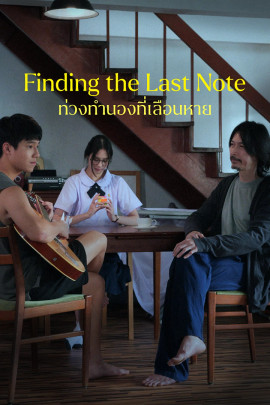เสฉวน ไฟชีวิตที่ยังลุกโชน
เสฉวน ไฟชีวิตที่ยังลุกโชน
สำหรับชาวจีนยึดมั่นในความกตัญญู ซื่อสัตย์ และมีความมุมานะสร้างความมั่นคงให้ตัวเอง ซึ่งปลูกฝังกันมาเช่นนี้ตั้งแต่รุ่นก่อน สิ่งเหล่านี้เป็นคุณค่าของชีวิตและวงศ์ตระกูล ด้วยเหตุนี้พวกเขาจึงต้องรับภาระหนัก มุ่งเนื้อสร้างตัว ดูแลบุพการีและคนในครอบครัว พวกเขาโหมทำงานกันเฉลี่ยราว 48-49 ชั่วโมงต่อสัปดาห์ หลายคนยังถูกคาดหวังให้ทำงาน สัปดาห์ละ 72 ชั่วโมง ตามวัฒนธรรม "996" คือเริ่มทำงานตอน 9 โมงเช้า และเลิก 3 ทุ่ม สัปดาห์ละ 6 วัน รัฐบาลจีนพยายามยกเลิกวัฒนธรรม “996” เพื่อคลายความกดดันในการใช้ชีวิต แต่ดูเหมือนว่า รากของวัฒนธรรมนี้จะฝังลึกกว่าที่คิด สถิติบันทึกไว้เมื่อกุมภาพันธ์ ปี ค.ศ.2025 ว่าการว่างงานในหนุ่มสาววัย 16-24 ปี อยู่ที่ 16.9% และมีแนวโน้มที่จะเพิ่มสูงขึ้นอีก เมื่อความเครียดถาโถม จนถึงจุดหนี่ง ชาวจีนไม่น้อยกำลังประสบภาวะ Burnout หรือที่เรียกว่า “ภาวะหมดไฟ” ทั้งเหนื่อยล้า และรู้สึกว่าตัวตนนั้นหดเล็กลง... จริง ๆ แล้วเราต้องการสิ่งใดให้กับชีวิตกันแน่
SICHUAN: THE FLAME OF LIFE THAT STILL BURNS
Chinese people have been brought up with values of filial piety, loyalty, and hard work. These values, which have been inherited from previous generations, are closely tied to ideas concerning the worthiness of one’s life and the upholding of family honor. For this reason, Chinese people must “bear the burden” of building economic security, while also looking after their parents and family, and dealing with pressures from socio-economic conditions that are becoming “increasingly difficult” to navigate…each and every day. Chinese people work about 48 hours per week…and many are expected to work 72 hours a week, according to the 9-9-6 working hour system. Under this system, employees work from 9 a.m. to 9 p.m…6 days per week. The Chinese government has made attempts to put an end to the 996 system to relieve the pressure on people’s lives. But it seems that 996 as a cultural trend has “taken root” very deeply in the societal fabric of China. According to data from the National Bureau of Statistics, which was recorded in February 2025, the unemployment rate among Chinese youths aged 16 to 24 was at 16.9 percent…and likely to go even higher. When stress levels rise to a certain point, the result is “burnout” which is experienced by “a significant part” of the Chinese population. These people are exhausted; they feel that “their sense of being” has been reduced. At the end of the day, the question is…what exactly do we want in life?
ติดตามได้ในรายการ Spirit of Asia ตอน เสฉวน ไฟชีวิตที่ยังลุกโชน วันอาทิตย์ที่ 23 พฤศจิกายน 2568 เวลา 16.30 - 17.00 น. ทางไทยพีบีเอส และสามารถเลือกรับชมด้วยเสียงภาคภาษาอังกฤษ คลิก Setting ไปที่ Audio Track เลือกเสียง ซาวด์แทร็ก
แท็กที่เกี่ยวข้อง:
Spirit of Asia

Turkish Pigeon Keeper: พิราบที่รัก
13 ก.ค. 68
อานาโตเลียตะวันออกเฉียงใต้ ชายแดนแห่งอารยธรรมโลก
20 ก.ค. 68
วิถีทิเบตบนเส้นขอบฟ้า
3 ส.ค. 68
ซินเจียง เขตแดนใหม่ใจกลางเอเชีย
10 ส.ค. 68
คัชการ์ จากเส้นทางสายไหมสู่หนึ่งแถบหนึ่งเส้นทาง
17 ส.ค. 68
ซินเจียง เขตการค้าเสรีของจีนใหม่ยุค AI
24 ส.ค. 68
นิคมเกษตรอัจฉริยะบนผืนทะเลทราย
31 ส.ค. 68
พลิกฟ้าฟื้นดินในเมืองโอเอซิส
7 ก.ย. 68
เปิดฉากแฟชั่นเวียดนาม
14 ก.ย. 68
ฟูก๊วกเวียดนาม เกาะชายขอบอ่าวไทย
21 ก.ย. 68เวียดนาม นวัตกรรมการเกษตรเพื่อความมั่นคง
5 ต.ค. 68สัตว์มหัศจรรย์ในทุ่งหญ้ามองโกล
12 ต.ค. 68สัตว์มหัศจรรย์ในทุ่งหญ้ามองโกล
12 ต.ค. 68เสียง(ที่)เปลี่ยนของ "บู"
2 พ.ย. 68อิสรชน ท่ามกลางสายลมที่เปลี่ยนแปลง
9 พ.ย. 68กำเนิด หมาล่า
16 พ.ย. 68เสฉวน ไฟชีวิตที่ยังบุกโชน
23 พ.ย. 68ฉงชิ่ง เมืองต่างระดับที่ลุ่มน้ำแยงซี
7 ธ.ค. 68เหมืองสร้างเมือง ตอนที่ 1: ต้นปลายสายแร่
14 ธ.ค. 68เหมืองสร้างเมือง ตอนที่ 2: ดีบุกผู้บุกเบิก
21 ธ.ค. 68เหมืองสร้างเมือง ตอนที่ 3: สายแร่ในวันที่ซบเซา
21 ธ.ค. 68เหมืองสร้างเมือง ตอนที่ 4: รื้อฟื้นคืนดี(บุก)
28 ธ.ค. 68มีอะไรในบังกลาเทศ
28 ธ.ค. 68
Spirit of Asia

Turkish Pigeon Keeper: พิราบที่รัก
13 ก.ค. 68
อานาโตเลียตะวันออกเฉียงใต้ ชายแดนแห่งอารยธรรมโลก
20 ก.ค. 68
วิถีทิเบตบนเส้นขอบฟ้า
3 ส.ค. 68
ซินเจียง เขตแดนใหม่ใจกลางเอเชีย
10 ส.ค. 68
คัชการ์ จากเส้นทางสายไหมสู่หนึ่งแถบหนึ่งเส้นทาง
17 ส.ค. 68
ซินเจียง เขตการค้าเสรีของจีนใหม่ยุค AI
24 ส.ค. 68
นิคมเกษตรอัจฉริยะบนผืนทะเลทราย
31 ส.ค. 68
พลิกฟ้าฟื้นดินในเมืองโอเอซิส
7 ก.ย. 68
เปิดฉากแฟชั่นเวียดนาม
14 ก.ย. 68
ฟูก๊วกเวียดนาม เกาะชายขอบอ่าวไทย
21 ก.ย. 68เวียดนาม นวัตกรรมการเกษตรเพื่อความมั่นคง
5 ต.ค. 68สัตว์มหัศจรรย์ในทุ่งหญ้ามองโกล
12 ต.ค. 68สัตว์มหัศจรรย์ในทุ่งหญ้ามองโกล
12 ต.ค. 68เสียง(ที่)เปลี่ยนของ "บู"
2 พ.ย. 68อิสรชน ท่ามกลางสายลมที่เปลี่ยนแปลง
9 พ.ย. 68กำเนิด หมาล่า
16 พ.ย. 68เสฉวน ไฟชีวิตที่ยังบุกโชน
23 พ.ย. 68ฉงชิ่ง เมืองต่างระดับที่ลุ่มน้ำแยงซี
7 ธ.ค. 68เหมืองสร้างเมือง ตอนที่ 1: ต้นปลายสายแร่
14 ธ.ค. 68เหมืองสร้างเมือง ตอนที่ 2: ดีบุกผู้บุกเบิก
21 ธ.ค. 68เหมืองสร้างเมือง ตอนที่ 3: สายแร่ในวันที่ซบเซา
21 ธ.ค. 68เหมืองสร้างเมือง ตอนที่ 4: รื้อฟื้นคืนดี(บุก)
28 ธ.ค. 68มีอะไรในบังกลาเทศ
28 ธ.ค. 68









